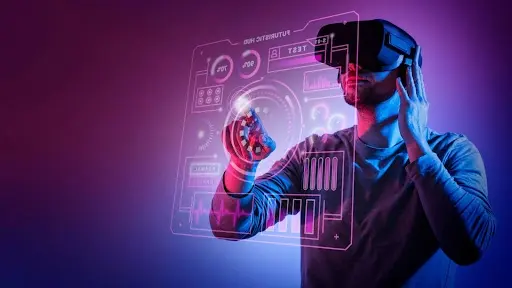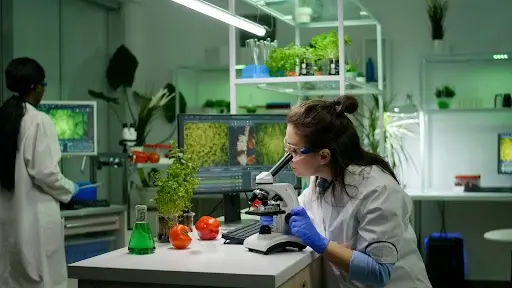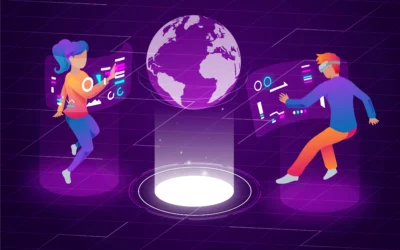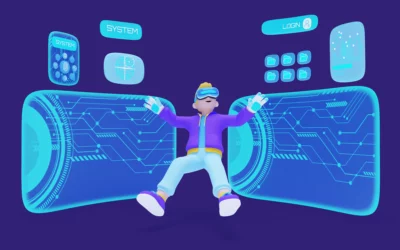- Quantum Computing
- 5G Network
- Artificial Intelligence (AI)
- Augmented Reality (AR)
- Biotechnology
Quantum Computing
 Quantum computing is a field of computing that uses quantum-mechanical phenomena, such as superposition and entanglement, to perform operations on data. Unlike classical computing, which uses bits to represent data as either 0 or 1, quantum computing uses qubits, which can represent multiple states simultaneously.
Quantum computing is a field of computing that uses quantum-mechanical phenomena, such as superposition and entanglement, to perform operations on data. Unlike classical computing, which uses bits to represent data as either 0 or 1, quantum computing uses qubits, which can represent multiple states simultaneously.
Quantum computers are able to perform calculations at exponentially faster rates than traditional computers, and they have the potential to revolutionize various industries, such as finance, logistics, and drug discovery, by enabling faster and more efficient processing of large datasets. It could also be used to solve complex optimization problems that are currently intractable with classical computing methods.It could also be used to solve complex optimization problems that are currently intractable with classical computing methods. In 2024, we can expect to see more practical applications of this technology, such as improved weather forecasting and advanced encryption methods.
However, quantum computing is still in its early stages of development, and there are several challenges that need to be overcome before it can be widely adopted. One of the main challenges is developing error-correcting codes that can deal with the high levels of noise and decoherence that are inherent in quantum systems. Another challenge is scaling up quantum systems to the point where they can perform useful computations.
Despite these challenges, many companies and research organizations are investing in quantum computing research and development, and there are already several commercially available quantum computers on the market. As the technology continues to advance, it has the potential to transform the way we think about computing and unlock new possibilities for innovation and discovery.
5G Networks
 5G networks are the next generation of mobile networks, offer faster data transfer rates, lower latency, and more reliable connections than previous generations of cellular networks. 5G networks use higher frequency radio waves and advanced antenna technologies to deliver these improvements. In 2024, we can expect to see widespread adoption of 5G networks, which will enable new technologies such as self-driving cars and remote surgery.
5G networks are the next generation of mobile networks, offer faster data transfer rates, lower latency, and more reliable connections than previous generations of cellular networks. 5G networks use higher frequency radio waves and advanced antenna technologies to deliver these improvements. In 2024, we can expect to see widespread adoption of 5G networks, which will enable new technologies such as self-driving cars and remote surgery.
With its increased speed and capacity, 5G has the potential to revolutionize various industries, from entertainment and gaming to transportation and healthcare. It could enable new technologies such as self-driving cars, remote surgery, and smart cities.
However, the deployment of 5G networks also raises concerns about privacy, security, and the potential health effects of exposure to radio waves. Some people worry that the higher frequency radio waves used by 5G networks could have harmful effects on human health, although the scientific evidence for this is still inconclusive.
5G networks are still being rolled out around the world, and their adoption is expected to accelerate in the coming years. As with any emerging technology, there are both opportunities and challenges associated with 5G, and it will be important to carefully consider and address these as the technology continues to evolve.
Artificial Intelligence (AI)
 AI is already being used in a variety of applications, from chatbots to fraud detection. In 2024, we can expect to see more sophisticated applications of AI, such as personalized medicine and predictive maintenance for industrial equipment.
AI is already being used in a variety of applications, from chatbots to fraud detection. In 2024, we can expect to see more sophisticated applications of AI, such as personalized medicine and predictive maintenance for industrial equipment.
Artificial intelligence (AI) refers to the simulation of human intelligence in machines that are programmed to perform tasks that normally require human intelligence, such as visual perception, speech recognition, decision-making, and natural language processing.
AI technologies include machine learning, deep learning, natural language processing, computer vision, and robotics. These technologies are being applied in various industries, such as healthcare, finance, education, transportation, and manufacturing, to automate processes, improve efficiency, and enhance decision-making.
AI has the potential to revolutionize many aspects of society and industry, but it also raises ethical, legal, and social concerns. For example, there are concerns about the impact of AI on employment, privacy, bias, transparency, and accountability. It will be important to carefully consider and address these concerns as AI technologies continue to advance and become more integrated into our daily lives.
Despite these concerns, the development of AI continues to accelerate, and it is likely to play an increasingly important role in shaping the future of society and industry. As with any emerging technology, it will be important to balance the benefits of AI with its potential risks and ensure that it is developed and used in a responsible and ethical manner.
Augmented Reality (AR)
 AR overlays digital information onto the real world, and it has the potential to transform industries from retail to education. In 2024, we can expect to see more immersive AR experiences, such as virtual shopping and training simulations.
AR overlays digital information onto the real world, and it has the potential to transform industries from retail to education. In 2024, we can expect to see more immersive AR experiences, such as virtual shopping and training simulations.
Augmented reality (AR) is a technology that superimposes digital content, such as images, videos, or 3D models, onto the real world. AR technologies use cameras, sensors, and computer algorithms to identify real-world objects and environments and overlay digital content onto them in real-time.
AR has many applications, from gaming and entertainment to education, healthcare, and retail. It can be used to create immersive experiences that enhance learning, visualization, and engagement, or to provide real-time information and guidance in various contexts.
AR can also be used in industries such as architecture, engineering, and construction to visualize designs and models in real-world contexts, improving accuracy and efficiency. In retail, AR can be used to provide virtual try-ons and product visualizations, enhancing the shopping experience for customers.
AR is still a relatively new technology, and there are many challenges associated with its development and adoption, such as limited processing power, battery life, and accuracy. However, as the technology continues to improve and become more accessible, it has the potential to transform the way we interact with the world around us and unlock new possibilities for innovation and creativity.
Biotechnology
 Biotechnology has the potential to revolutionize medicine, agriculture, and energy production. In 2024, we can expect to see more breakthroughs in gene editing, personalized medicine, and sustainable energy sources.
Biotechnology has the potential to revolutionize medicine, agriculture, and energy production. In 2024, we can expect to see more breakthroughs in gene editing, personalized medicine, and sustainable energy sources.
Biotechnology is the use of living organisms or biological processes to develop new products or technologies for various applications. Biotechnology encompasses a wide range of fields, including genetic engineering, biochemistry, microbiology, and molecular biology.
Biotechnology has many applications, from agriculture and food production to healthcare and environmental science. In agriculture, biotechnology is used to develop crops that are more resistant to pests, drought, or other environmental stresses, and to improve the yield and quality of food. In healthcare, biotechnology is used to develop new drugs, therapies, and medical devices for various diseases and conditions.
Biotechnology is also used in environmental science to develop solutions for pollution control, waste management, and conservation. For example, bioremediation uses microorganisms to break down or remove pollutants from contaminated soil or water.
Biotechnology is a rapidly growing field, and its applications are expected to continue expanding in the coming years. However, there are also concerns about the potential risks associated with biotechnology, such as unintended environmental consequences or unintended effects on human health. It will be important to carefully consider and address these concerns as biotechnology continues to evolve and become more integrated into our lives.
Conclusion
These emerging technologies offer exciting opportunities for innovation and growth, but they also raise new ethical, legal, and social challenges that must be carefully considered. As we look to the future, it’s important to ensure that these technologies are developed and used in ways that benefit society as a whole.





